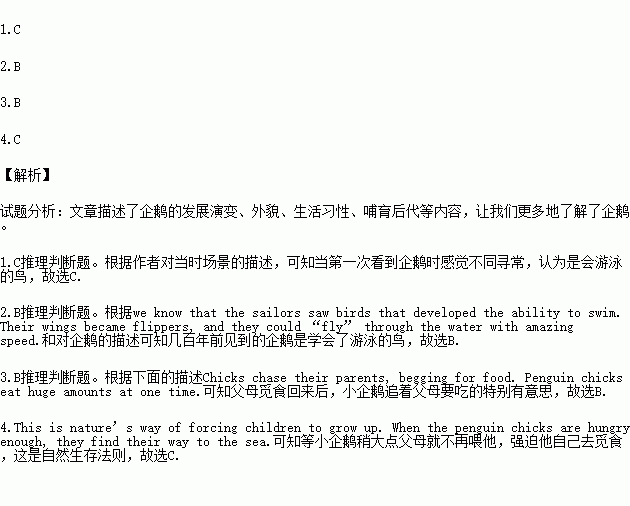题目内容
Imagine being a crew member, hundreds of years ago, sailing in southern waters. Your captain is searching for food while exploring unfamiliar waters. Your job is to watch the sea off the ship’s side for ice. The wind is cold on your face. Alongside the ship, a fish darts past. Another slows to a stop and raises its head above the water to look at you. How could a fish do that?
Did the sailors see fish with feathers or swimming birds? Today, we know that the sailors saw birds that developed the ability to swim. Their wings became flippers, and they could “fly” through the water with amazing speed.
There are many types of penguins. Only two kinds raise their young on the continent of Antarctic. Adelie penguins grow up to 29 inches tall and have a white ring around each eye. Emperor penguins have yellow orange color near their necks. Standing about 35 inches tall, they are the tallest penguins living today.
Emperor penguins have nests on top of their feet. Father Emperor penguins keep the egg on top of their feet for more than two months, until the egg is ready to hatch. The mother penguin goes out for food during that time. Imagine holding an egg on your feet for two months until someone returns with food!
Male and female penguins are both good parents. Once the chicks hatch, both parents travel long distances to find food for them in the sea. It may be days before the parents return and the chicks eat again. When they return with food, the fun really begins. Chicks chase their parents, begging for food. Penguin chicks eat huge amounts at one time.
Eventually, the adult penguins stop feeding the chicks. This is nature’s way of forcing children to grow up. When the penguin chicks are hungry enough, they find their way to the sea. Without any swimming lessons, they make their way into the icy waters and swim as only penguins do.
1.What does the author mainly want to tell us in Paragraph 1?
A. It is dangerous to sail in unfamiliar waters.
B. The ice covers southern waters as far as we can see.
C. Penguins seemed unusual when the sailors first saw them.
D. It is difficult to find food if sailing in southern waters.
2.We now know that penguins seen by the sailors hundreds of years ago were .
A. fish with the ability to fly
B. birds that had learned to swim
C. birds that could fly into the sea
D. fish with black and white feathers
3.Why does the author say “the fun really begins” when the parents return with food?
A. The chicks play games with each other while eating.
B. The chicks run after the parents while trying to get food.
C. The chicks have to find their way to the sea to get more food.
D. The chicks have to search for the food the parents have hidden.
4.Emperor penguin chicks will be forced to grow up when they .
A. must learn how to feed others
B. have to find a new place to live
C. have to find food by themselves
D. need to adjust to the changeable weather
 优加精卷系列答案
优加精卷系列答案
